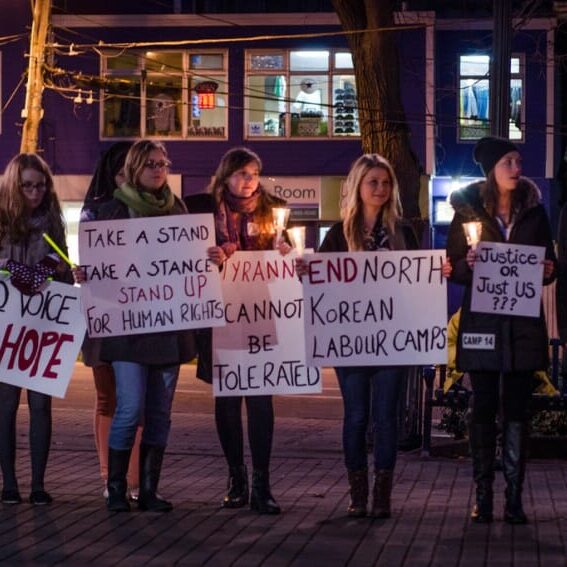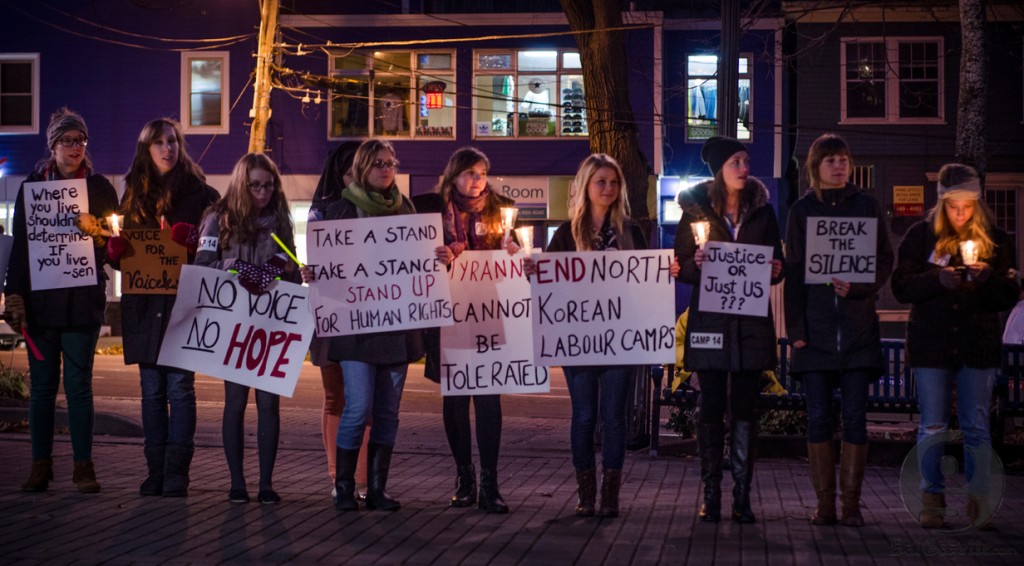

The ‘Parade of Rights’ stopped in Victoria Park before heading to the Security Forum. (Calum Agnew photo)
For many students, group projects mean scheduling frustration, unfair division of labour and way, way too many emails, eventually culminating in a PowerPoint presented to your half-conscious classmates.
One class has taken the group project someplace new: the streets of Halifax, and the halls of parliament.
***
“Tyranny won’t be tolerated!” shout the students of INTD 3003: Development and Activism. A few members of the class are playing instruments: a flute, drums and guitars.
The class is standing in the shadow of Cornwallis, (in)famous for founding Halifax, and for placing a bounty on Mi’kmaq scalps. Just a hundred meters away, the politicians and generals from around the world sat, dined and discussed the security issues of the day during the Halifax International Security Forum.
The group began marching from Dal campus at 4:30 on Nov. 16., and worked its way down to the park, handing out pamphlets and picking up pedestrians along the way.
Inspired by the book Camp 14, which recounts the escape of Shin Dong-hyuk from the North Korean labour camp in which he was born, the class was hoping to raise awareness of human rights violations in the isolated totalitarian state.
Kristen Mandala is a third-year international development studies (IDS) student.
“Our goal is awareness,” she says. “Government or public acknowledgment of the camps will go a long way.”
Rob Huish has been teaching the class for just three years, but it’s already one of the more popular courses in the IDS department. It’s even been made a core part of the curriculum; students have to take either this class or Development Practice.
The course teaches students how to organize, set up websites and distribute press releases. There are teams of speech-writers, sign-makers, photographers — and, yes, musicians. In the past, the course has focused on world hunger — North Korea is a new topic.
David Bleecker is a fourth-year IDS student. He says that IDS is often too theoretical, but this class is different.
“I’ve been really amazingly happy with this class,” he says. “It’s something concrete, which I don’t always get at university.”
“I throw out most of my notebooks,” says Bleecker. “I’m stashing this one away.”
“It’s taught me how to approach these issues I care about.”
On Nov. 19 the students sent their books, along with personal letters, to dozens members of parliament.
Although the program’s been a hit with many students, it’s not without controversy. Perhaps unsurprisingly, the class provoked mixed commentary from national media. A blog post published by Maclean’s said the class “practically begs skeptics to cast a pitiful sigh.”
Huish says he heard the criticisms—some of which came from within the school. He’s written about the course for the Canadian Centre for Policy Alternatives. The Canadian Journal for Development Studies is running an article on the class next year.
“When we first offered the course in 2010, the Arab Spring hadn’t happened yet, Occupy hadn’t happened yet; none of that was going on,” says Huish. “And what people had in their mind was the more destructive tendencies of protests, particularly coming out of G20.”
“And yeah, there was some hesitation, and a lot of strong questions from other faculty members about it,” he says. But Huish says activism is an integral part of development.
“If you look at it historically, a lot of the progressive social change we’ve had in this country has been proceeded by activism: well-organized individuals who get together, to clearly send out a message,” he says.
“They have practicums in medicine, they have practicums in law, engineering—we want to do hands on, experiential learning,” he says.
“Every single course that I teach here, there’s always a connection to the real world. It’s never just sitting back in the armchair and critiquing the world and saying why it’s all a mess. It’s about trying to find solutions.”
Graduates from the course have gone on to organize many events, from PowerShift, which took place this October in Ottawa, to Occupy NS.
“If you think back to the climate conference in Durban, where there was a group of students who turned their back on Peter Kent—those were graduates of our class,” he says.
Huish sees the class as part of a bigger shift in international development studies.
“I think the generation of faculty before me were content to say ‘Well, the world’s pretty messed up. Over to you!’” says Huish.
“The assumption that you can just critically reflect on the problems in the world and then people will just organically come up with solutions is a bit naïve.”






